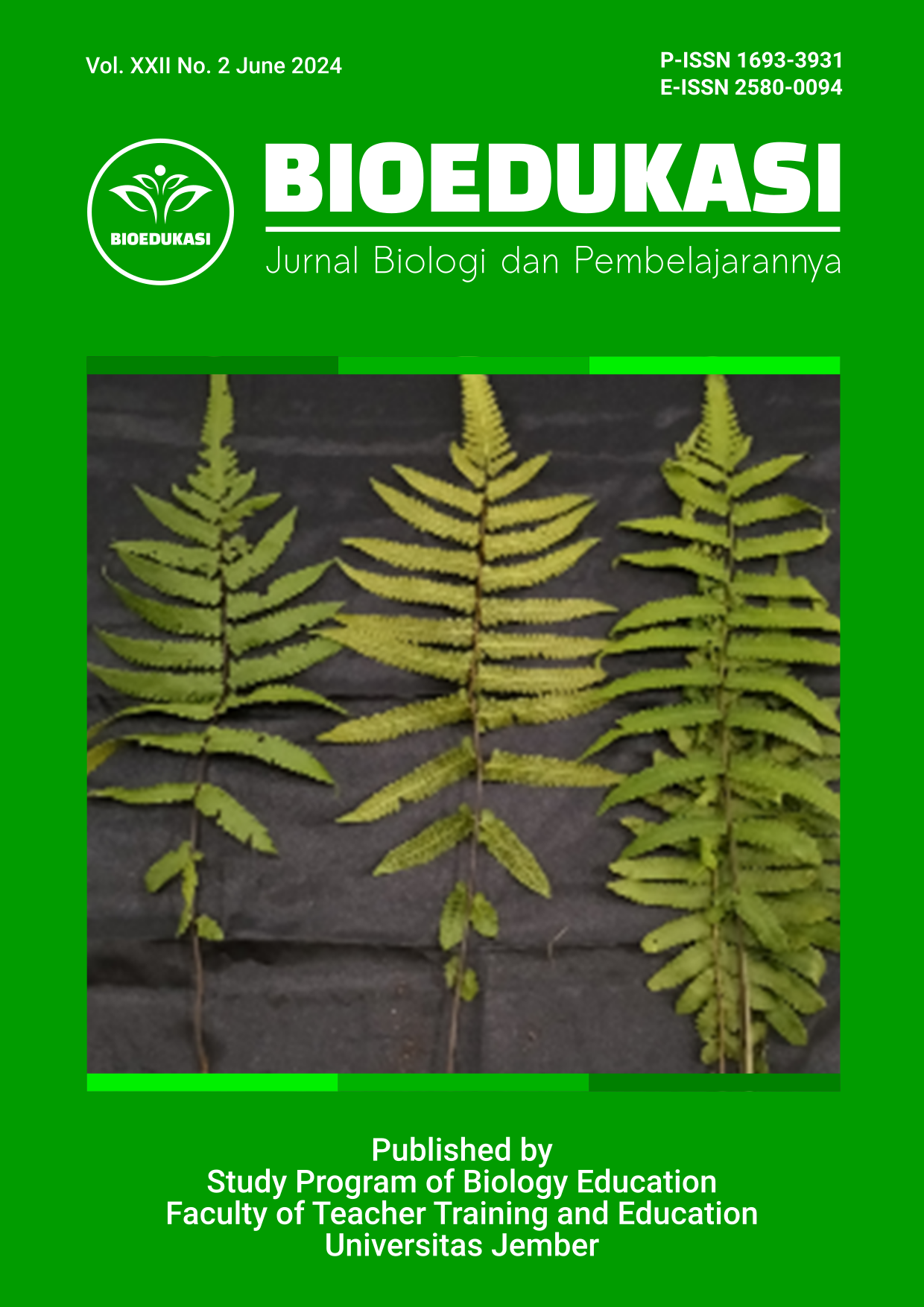Development of E-Module for Plant Physiology Courses Based on Problem Based Learning to Increase Student's Critical Thinking Skills on Nutrition, Transportation and Photosynthesis
DOI:
https://doi.org/10.19184/bioedu.v22i2.46624Keywords:
Critical Thinking Skills, E-module, Nutrient Transport, Photosynthesis, Problem Based LearningAbstract
This development research aims to develop, test the validation, practicality and effectiveness of e-modules in improving students' critical thinking skills for plant physiology courses. The material used in the implementation stage focuses on the material of Nutrition and Nutrient Transport in Plants. The method used Research and Development (R&D) development using the Lee & Owens model development design. The research was conducted at the State University of Malang on students majoring in biology education semester 3 totaling 33 experimental class students and 33 control class students. The results obtained from material validation are 100% with very valid criteria. Furthermore, media validation is 95.47% with very valid criteria, practitioner validation with a percentage value of 97.27% with very valid criteria. Practicality test averaged 96% including very practical criteria. The effectiveness test was obtained through the e-module implementation stage with the Nonrandomized Control-Group Pretest-Posttest Design research design using the N-gain score calculation which was 0.70 with high criteria on experimental class. 0.29 for control class which was on low criteria. Based on the test results that have been carried out, the development of e-modules based on Problem-based learning in critical thinking skills is said to be valid, practical, and effective in improving students' critical thinking skills.
Downloads
References
Andriyani, R & Saputra, N.N.(2020). Kepraktisan Media Pembelajaran Daya Anti Bakteri Ekstrak Buah Sawo Berbasis Macromedia Flash. Quantum Jurnal Inovasi Pendidikan Sains, II(1).
Anggur, M. R. I., Kundariati, M. (2021). Analisis kesulitan berpikir kreatif menggunakan model pembelajaran Problem-Based Learning (PBL) pada Topik Translokasi Asimilat. Prosiding December 2021.
Akbar, S. (2017). Instrumen Perangkat Pembelajaran. Bandung: PT Remaja Rosdakarya.
Hake, R, R. (1999). Analyzing Change/Gain Scores.AREA-D American Education Research Association’s Devision.D, Measurement and Reasearch Methodology.
Hart, C, Da, C., Souza, D.D., Kimpton, A,&Ljbusic, J. (2021). Exploring higher education students’ critical thinking skills through content analysis, Thinking Skills and Creativity, 41, 100877.
Leedy, Paul D adnd Jeanne Ellis Ormrod. 2021. Practical Research Planning and Design Twelfth Edition. United States of America: Pearson education.
Lee, W. W., & Owens, D. L. (2004). Multimedia - Based Instructional Design (R. Taff (ed.); second). Pfeiffer. https://id1lib.org/book/489421/985989
Malik, A. S. (2021). Pengembangan E-Modul Berbantuan Sigil Software Dan Analisis Kemampuan Berpikir Kritis Siswa. Pasundan Journal of Mathematics Education : Jurnal Pendidikan Matematika, 11 (Vol 11 No 1).
Nurhidayat, F. (2021). Pengembangan E-Modul Berbasis Problem Based Learning Untuk Membedakan Kemampuan Berpikir Kritis Siswa Pada Mata Pelajaran. 2663, 1–8.
Pahrudin, A., Zahra, Y. F., Supriadi, N., Sugiharta, I., Farida, F., & Suherman, S. (2021). Assessing moodle-assisted e-learning for students’ concept understanding and critical thinking skills in algebra. Al-Jabar : Jurnal Pendidikan Matematika, 12(2), 359–369.
Suarsana, G. M. (2019). Pengembangan E-Modul Berorientasi Pemecahan Masalah. Jurnal Pendidikan Indonesia. Jurnal Pendidikan Indonesia, 2(2), 264–275.
Silalahi, M.V. S. (2020) IJEACA International journal of education & curriulum Application Development of E-modules Based on Exe-learning of topics of reaction rate against student learning outcomes. Mechanical Engineering. 3.
Van Laar, E., van Deursen, A. J. A. M., van Dijk, J. A. G. M., & de Haan, J. (2020). Determinants of 21st-Century Skills and 21st-Century Digital Skills for Workers: A Systematic Literature Review. SAGE Open, 10(1).
Yetti, W., & Ahyanuardi, A. (2020). Pengembangan Modul E-Learning Berbasis LMS Sebagai Media Interaktif Pada Pelajaran Simulasi Dan Komukasi Digital. INVOTEK: Jurnal Inovasi Vokasional Dan Teknologi, 20(3), 81–88.




 https://orcid.org/0000-0003-1920-0515
https://orcid.org/0000-0003-1920-0515